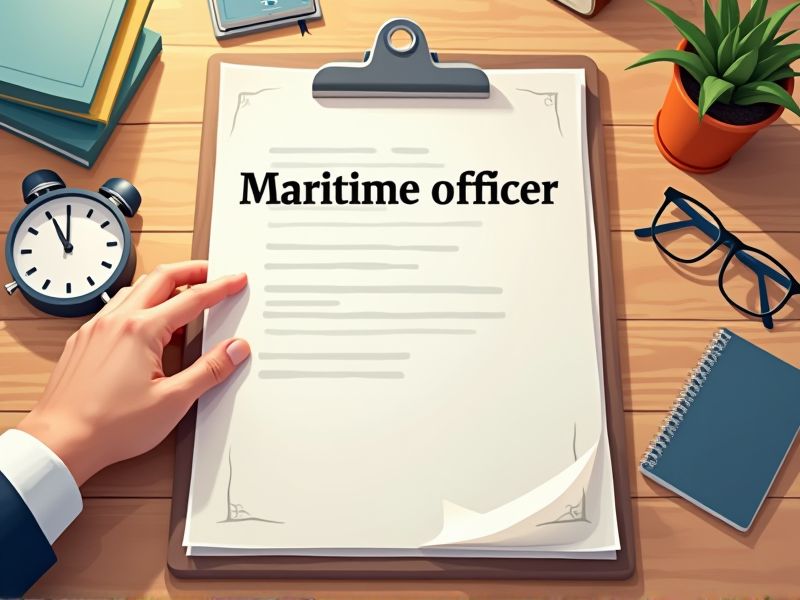
Maritime officers operate in complex environments where safety, navigation proficiency, and international regulations are paramount. Certifications ensure officers possess the necessary skills to manage emergencies, navigate vessels efficiently, and comply with maritime laws. Such qualifications also build trust among crew members and stakeholders, enhancing operational reliability. Below are essential certifications a maritime officer might require.
STCW Basic Safety Training
STCW Basic Safety Training is required to align maritime officers with international safety standards, reducing risks at sea. The training equips officers with essential skills to handle emergencies like fires or abandon ship situations, enhancing crew and passenger safety. Compliance with STCW standards fosters confidence in maritime professionals' ability to navigate hazards. Adhering to these protocols also impacts crew certification and employment opportunities globally.
GMDSS Operator Certificate
Possessing a GMDSS Operator Certificate ensures maritime officers can effectively communicate using advanced shipboard communication systems, vital for safety and coordination. The certificate verifies that officers can handle distress and safety communications, following international protocols. Being certified also helps ensure compliance with International Maritime Organization (IMO) regulations, which mandate GMDSS proficiency. This certification ultimately reduces risk by enhancing emergency response capabilities onboard vessels.
Advanced Fire Fighting Certificate (STCW)
The Advanced Fire Fighting Certificate (STCW) equips maritime officers with the skills to effectively manage and combat onboard fires, safeguarding vessel safety. Fire risk in maritime environments necessitates specialized training to handle complex scenarios that regular certifications may not cover. Having this certification enhances the officer's capability to lead firefighting operations, ensuring crew and passenger safety. Regulatory standards require it to align with international safety protocols, reducing liability and enhancing the ship's operational readiness.
Proficiency in Survival Craft and Rescue Boats Certificate
Proficiency in Survival Craft and Rescue Boats Certificate is essential for maritime officers because it equips them with skills to handle emergency situations at sea. This certification ensures that officers can safely deploy and manage lifeboats during abandon ship scenarios or casualties. Training enhances their ability to perform crucial rescue operations, potentially saving lives and preventing disasters. Regulatory compliance with international maritime standards requires such certification, underscoring its importance for operational safety.
Bridge Resource Management (BRM) Certificate
The Bridge Resource Management (BRM) Certificate is crucial for maritime officers as it enhances their ability to manage resources effectively, improving safety and operational efficiency. Studies show that human error accounts for a significant portion of maritime accidents, and BRM training aims to minimize these incidents by reinforcing teamwork and communication. This certification helps officers develop critical decision-making skills under pressure, essential for navigation and crisis management. Comprehensive BRM training aligns with international maritime regulations, ensuring crew compliance and consistency with global safety standards.
Officer of the Watch (OOW) Certification
The Officer of the Watch (OOW) Certification is required to ensure maritime officers possess the necessary skills and knowledge to safely navigate ships. It establishes a standardized level of competence, meeting international regulations such as those outlined by the International Maritime Organization. This certification minimizes the risk of maritime accidents by ensuring officers can effectively respond to emergencies. It also enhances career opportunities, as shipping companies prioritize hiring certified professionals to maintain operational safety and regulatory compliance.
Ship Security Officer (SSO) Certificate
The International Ship and Port Facility Security (ISPS) Code mandates Ship Security Officer (SSO) certification to ensure maritime officers are trained in security protocols. Without the SSO certification, maritime officers may lack essential skills in identifying and managing security threats. Achieving this certification equips officers with the knowledge to implement and supervise a ship's security plan effectively. The presence of certificated SSOs contributes to international maritime safety, fostering a secure trade environment.
Maritime English Proficiency Certificate
The Maritime English Proficiency Certificate is critical because communication clarity is essential for safety and efficiency at sea. Misunderstandings due to language barriers can lead to accidents and operational delays. International crews often work together, necessitating a common linguistic standard for effective collaboration. Regulatory bodies, like the International Maritime Organization, set these standards to ensure compliance and facilitate global maritime operations.
Cargo Handling and Stowage Certification
A Cargo Handling and Stowage Certification equips maritime officers with the necessary skills to manage and secure cargo effectively, minimizing potential damages during transit. This certification ensures compliance with international regulations, reducing the risk of legal issues due to improper cargo handling. Enhanced knowledge in stowage strategies promotes operational efficiency, leading to time and cost savings for shipping companies. With certified training, maritime officers are better prepared to respond to emergencies, safeguarding both the vessel and its cargo.
Medical First Aid and CPR Certification
In maritime environments, emergencies can occur far from immediate medical help, necessitating Maritime officers to possess first aid and CPR skills to stabilize individuals until professional assistance arrives. The International Convention on Standards of Training, Certification, and Watchkeeping for Seafarers mandates these certifications to ensure a standardized level of emergency readiness among personnel. CPR and first aid knowledge enable officers to effectively address common shipboard injuries and medical issues, reducing the risk of complications during prolonged maritime journeys. Enhanced emergency response capabilities can improve overall crew safety and boost confidence in crisis situations, fostering a secure and effective working environment at sea.
Summary
When you obtain specialized maritime certifications, your career prospects improve significantly within the industry. Employers often view certified officers as more competent and reliable, which can lead to faster career advancement and higher salary potential. Certified officers are also more likely to be assigned to more complex and prestigious projects, enhancing their professional reputation. Consequently, your skill set becomes more diverse, providing increased job security and opportunities for long-term growth.
